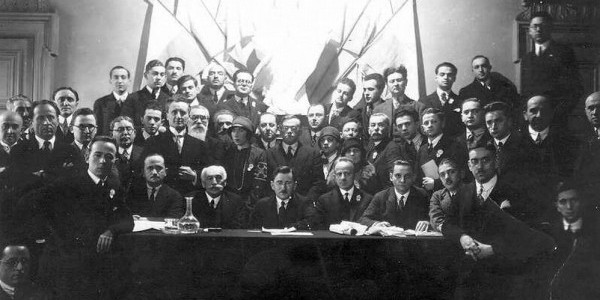The Jabotinsky Paradox
02/08/2021 | Na stronie od 02/08/2021

Ze’ev Jabotinsky (second row in the very center, wearing glasses) at a Revisionist Zionist conference likely in Paris in the second half of the 1920s. Wikipedia.
Source: Mossaic 02.08.2021
How could the man who at one point openly scorned religion also be the forefather of the political coalition that ensured for it a key place in Israeli life?
Avi Shilon
Avi Shilon, a historian and political scientist, is the author of Menachem Begin: A Life (2012), Ben-Gurion: His Later Years in the Political Wilderness (2016), and, most recently, The Left Wing’s Sorrow: Yossi Beilin and the Decline of the Peace Camp (Hebrew, 2017). He teaches at NYU’s Tel Aviv campus and Ben-Gurion University, and contributes op-ed pieces to Haaretz.
In 1919, a fierce debate broke out among the Jews of the Land of Israel, much like the one raging in the U.S. at the same time, over the question of whether women should be allowed to vote in the emerging institutions of Jewish self-government. The debate pitted secular Jews against the Orthodox, and especially members of the staunchly traditionalist Old Yishuv, so called because it had been established before the Zionist pioneers began to arrive in the 1880s. Despite his reputation as a moderate, Abraham Isaac ha-Kohen Kook, the chief rabbi of Jerusalem—and soon thereafter of Palestine—came out against women’s suffrage. Vladimir Jabotinsky, a prominent anti-socialist Zionist who in 1925 would found the right-wing Revisionist movement (the precursor of today’s Likud), was incensed. To him, Rabbi Kook and his supporters were ignoramuses “who came out of a hole in the wall . . . and never heard the name of John Stuart Mill.” (...)